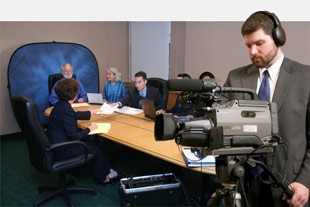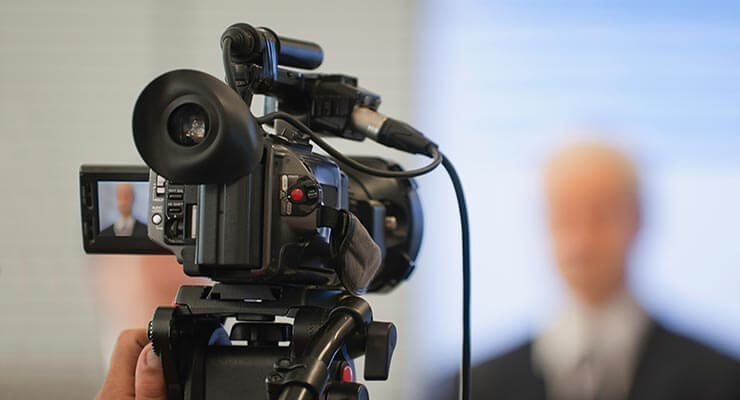The Function of Legal Videography in Depositions and Tests
Legal videography has actually emerged as a crucial device in both depositions and trials, giving a diverse approach to documenting witness testimonies. As legal specialists progressively recognize its worth, it prompts a much deeper examination of just how these visual records can affect juror understandings and test outcomes.

Value of Lawful Videography
Legal videography plays an essential role in the documents and presentation of depositions and tests. This specific area combines technological abilities with legal expertise to create a dependable document of proceedings that can considerably affect case end results. The appearance of legal videography improves the understanding of witness testimony, allowing jurors and courts to observe not only the talked words however additionally the demeanor, emotions, and body movement of the witnesses.
Additionally, legal videography supplies an unbiased account of events, reducing the possibility for misconception that can take place with created transcripts alone. This visual documentation acts as a crucial tool throughout test discussions, facilitating a clearer and more convincing story for both complainants and defendants. The capacity to replay video clip sectors throughout court procedures makes it possible for lawful groups to emphasize vital factors, strengthening their arguments properly.
The value of legal videography expands beyond the courtroom; it likewise plays a vital duty in protecting evidence for future recommendation, whether for appeals or more legal activity. Its assimilation into the legal process is necessary for making sure a fair and precise representation of the truths, inevitably contributing to the search of justice.

Refine of Legal Videography
While recording the nuances of depositions and trials, the process of lawful videography entails several important actions that ensure top notch, exact recordings. An expert legal videographer prepares by examining the instance products and understanding the specific demands of the deposition or test. This prep work consists of acquainting themselves with the participants and the context, which aids in capturing essential information.
On the day of the recording, the videographer establishes the necessary equipment, which generally includes high-definition electronic cameras, microphones, and proper lighting. Guaranteeing ideal angles and audio high quality is crucial, as it directly affects the efficiency of the recording. The videographer interacts with attorneys and participants to establish protocols, ensuring that everyone recognizes the recording procedure.
Throughout the deposition or test, the videographer thoroughly tapes the procedures, paying attention to both verbal and non-verbal signs. This consists of catching the disposition and reactions of witnesses and lawyers. After the session wraps up, the videographer may modify the video for clearness and compliance with lawful requirements, producing an end product that precisely reflects the process for future recommendation and use in legal contexts.
Benefits in Depositions
The incorporation of videography in depositions offers numerous benefits that boost the general process of collecting evidence. One key advantage is the capability to capture witness testaments with aesthetic and auditory integrity, supplying a much more exact depiction of the witness's behavior, tone, and body language. This multidimensional strategy enables attorneys and juries to assess reliability a lot more effectively than conventional written transcripts alone.
In addition, videographed depositions function as an effective tool for protecting testament. Ought to a witness come to be unavailable for trial, their videotaped deposition can be played in court, guaranteeing that their proof continues to be available and pertinent. This aspect substantially reduces the risk of shedding crucial info that might influence case results.

Finally, videography improves the overall professionalism and trust of the deposition procedure, instilling confidence in clients concerning the thoroughness of their legal depiction (legal videography). By leveraging technology, lawful specialists can dramatically boost the performance of depositions
Influence On Tests
In numerous trials, the combination of videography can substantially influence the presentation of proof and the jury's perception. Legal videography records witness testaments and essential proof in a vibrant layout, permitting jurors to involve with the product on numerous degrees. This aesthetic element enhances the narration element of a test, giving context straight from the source and emotional resonance that typical text-based evidence may do not have.
Additionally, video recordings can work as powerful tools for impeachment throughout cross-examination. When disparities develop between a witness's previous statements and their court room statement, video proof provides an unbiased reference that can persuade jurors' opinions. This immediacy and quality can reinforce the credibility of a celebration's narrative while all at once weakening opposing debates.

Future Trends in Legal Videography
As we look toward the future of legal videography, several emerging trends promise to reshape its duty within the courtroom. One significant fad is the assimilation of artificial knowledge (AI) in video clip evaluation and editing and enhancing. AI can enhance the procedure of determining essential moments in recorded depositions, permitting lawyers to swiftly access appropriate material, thus enhancing efficiency in instance prep work.
Furthermore, the rise of virtual fact (VIRTUAL REALITY) and enhanced reality (AR) technologies is anticipated to transform how jurors experience proof. legal videography. By immersing jurors in a simulated setting, these innovations can offer a more extensive understanding of complicated scenarios, bring about even more informed considerations
Additionally, the enhancing need for remote depositions, sped up by the COVID-19 pandemic, will likely continue. Lawful videographers will require to adapt to brand-new software application and platforms to make certain high-grade recordings in online setups.
Finally, the expanding emphasis on information protection will demand Continued stricter protocols for keeping and sharing video proof. As the legal landscape progresses, legal videographers need to stay abreast of these fads to maintain their importance and efficiency in the judicial procedure.
Conclusion
In summary, legal videography offers a critical function in the judicial process, improving the honesty of depositions and tests. As technology continues to progress, next page lawful videography is positioned to further transform its function within the lawful landscape.